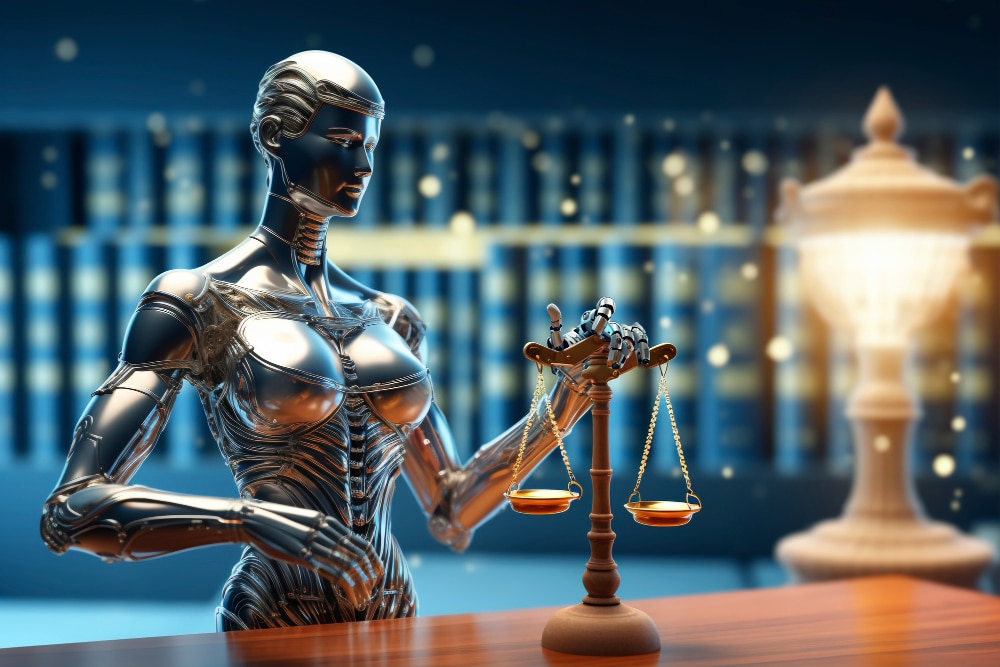The Artificial Intelligence (AI) has begun to transform the legal sector. significantly, providing technological solutions that optimize processes, reduce costs and increase efficiency. Although law has historically been a conservative and change-averse industry, the adoption of AI is revolutionizing the way lawyers, judges and other legal professionals work and manage information.
The incorporation of AI in this sector translates into automation of repetitive tasks, predictive analytics, improved decision making and more agile access to large volumes of data. This article analyzes the main areas where AI is impacting the legal sector, the benefits it brings and the challenges this technology faces in its implementation.
Artificial intelligence applications in the legal sector

AI is applied in a variety of areas within the legal world, improving the efficiency of law firms, courts and corporate legal departments. Some of the key applications are highlighted below.
Automation of repetitive tasks and legal processes.
AI has proven to be particularly effective in automation of repetitive taskssuch as document review, case law research or contract drafting. These tasks, which used to consume a great deal of time and resources, can now be handled by AI-based systems that analyze and process large amounts of data quickly and accurately.
- Review of contracts: AI tools can identify important clauses, compare versions of contracts and detect potential legal risks, allowing lawyers to focus on more complex issues.
- Due Diligence: In M&A processes, AI facilitates the review of documents and the identification of legal or financial risks. This enables legal teams to make more informed and faster decisions.
▶ You may be interested in: Tracking method for senate, congress and parliament
2. Predictive analytics and data-driven decisions
One of the most interesting areas where AI has made an impact is the predictive analyticswhich allows lawyers and firms to predict the outcome of litigation and other legal proceedings. Thanks to algorithms trained on large volumes of court cases and judgments, AI is able to identify patterns in previous decisions and provide estimates of the likely outcome of a case.
For example:
- Risk assessment: AI-based systems can analyze the likelihood of success or failure in litigation, allowing parties to better assess whether to go to trial or seek settlement.
- Strategic consulting: Analysis of court data helps to identify the position a defense should take based on previous rulings, increasing the likelihood of favorable outcomes.
3. Virtual paralegals
The use of chatbots and virtual paralegals is another growing trend in the legal sector, and an area where AI is playing a key role. These assistants, which operate through conversational interfaces, can answer basic legal questions, provide relevant information and guide users through simple legal processes.
For law firms, virtual assistants can provide faster and more accessible service to clients, while for the general public, they allow access to legal information without the need for a lawyer from the outset.
▶ You may be interested in: Improved legislative tracking tools
4. Document analysis and jurisprudence search
The natural language processing (NLP) is one of the branches of AI that has had a major impact on legal document analysis and case law search. NLP allows systems to analyze complex texts and extract relevant information much more efficiently than traditional methods.
The platforms of AI designed for the legal sector can crawl legal databases in seconds, extracting judgments, laws and other key documents, reducing the time lawyers spend on legal research.
Benefits of artificial intelligence in the legal sector
The use of AI in the legal field offers a number of tangible benefits that are transforming the way this sector operates.
Increased efficiency and cost reduction
One of the greatest benefits of AI is its ability to improve operational efficiency. Automated tools significantly reduce the time required to complete tasks such as document review or legal research, allowing lawyers to focus on activities that require analytical and strategic skills.
This also has a direct impact on the cost reduction. By reducing the time lawyers need to spend on manual tasks, law firms can offer more competitive services and handle more cases without increasing staff.
2. Accuracy in data management
AI makes it possible to handle large volumes of information accurately and efficiently, which is essential in the legal field, where access to information and accuracy are key. AI systems can analyze thousands of documents in a matter of minutes, detecting patterns that might go unnoticed by humans.
In addition, by using AI to manage data, lawyers can avoid human error, which contributes to more informed and accurate decision-making.
Improving legal accessibility
Another important benefit of AI is that it helps to improve the accessibility to the right. Through virtual assistants and online tools, AI makes it easier for people without in-depth knowledge of the law to access legal information more quickly and comprehensibly.
This not only democratizes access to legal services, but also allows law firms to provide initial attention to potential clients in a more agile and cost-effective manner.

Always stay one step ahead in the legislative arena!
Discover how our AI-based legislative tracking alerts can transform the way you work. Get relevant and up-to-date information instantly. Visit our website and start optimizing your legislative management today:
Challenges and ethical considerations of AI in the legal sector.
Despite the clear benefits that AI brings to the legal arena, its adoption is not without its challenges and ethical considerations. The implementation of these technologies raises questions about confidentiality, fairness and accuracy of automated systems.
Privacy and confidentiality
The handling of large volumes of data through AI systems raises concerns around the privacy and confidentiality. Lawyers are subject to strict ethical codes, and the use of AI-based systems to manage sensitive information must comply with the highest data protection standards.
Biases in the algorithms
Another challenge is the possible bias in AI algorithms. If the data on which artificial intelligence systems are trained are not diverse or contain biases, the results may reflect those same biases. This could lead to unfair or inaccurate decisions in certain legal contexts.
3. Job Replacement
Although AI improves efficiency, it also raises concerns about the job automation within the legal sector. Some fear that AI-based tools may replace certain professionals, especially in more routine tasks. However, the general view is that AI will serve as a support, allowing lawyers to focus on more strategic and value-added functions.
Conclusion: the future of artificial intelligence in the legal industry
The incorporation of the artificial intelligence in the legal sector is transforming legal practice, improving efficiency, reducing costs and optimizing the analysis of large volumes of data. Although it still faces challenges in terms of privacy and ethics, its adoption is growing and will continue to advance as technology evolves.
AI-based tools are not only making the work of lawyers and legal departments easier, but are also paving the way towards more democratic and efficient access to the law. The key to success in this sector will be finding the right balance between technological automation and human judgment, ensuring that ethical and fairness principles remain the cornerstone of the legal system.




